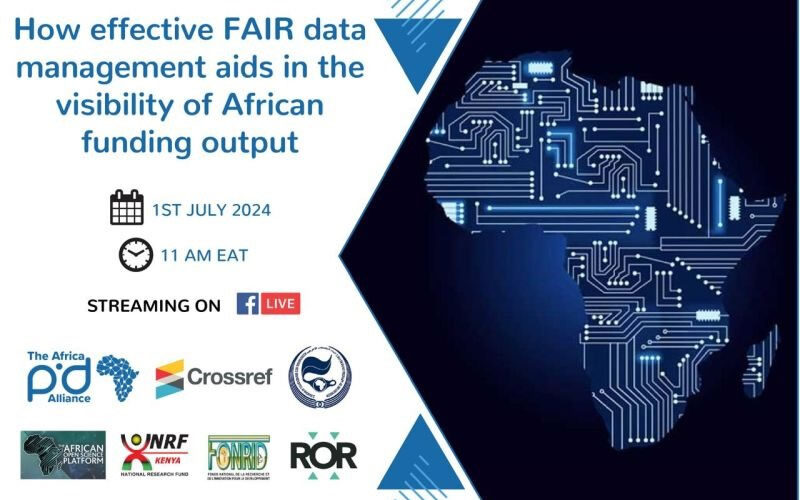The Africa PID Alliance recently convened a webinar that brought together key stakeholders in the African research ecosystem to discuss the critical role of persistent identifiers (PIDs) in enhancing the visibility of African research funders and their outputs. The event, which was held on 1st July 2024 and attracted over 400 participants, showcased the collaborative efforts of organizations like Crossref, the Research Organization Registry (ROR), and various African funders in addressing the longstanding issue of underrepresentation of African-funded research in global databases.
Ms. Joy Owango, the Executive Director of TCC Africa and the Africa PID Alliance project lead, opened the webinar by highlighting the importance of producing African-originated PIDs to support indigenous knowledge and cultural heritage. She highlighted the initiative’s broader mission to establish a robust system connecting funders, researchers, and research outputs, thereby accurately reflecting Africa’s contributions to global knowledge.
Amanda French from the Research Organization Registry (ROR) outlined efforts by the organization to ensure accurate and thorough representation of African research organizations in global registries. Kornelia Kozech from Crossref detailed their Grant Linking System, which is helping to create a more interconnected research ecosystem by linking funding information directly to research outputs.
Case studies presented by Robert Gicheru from Kenya’s National Research Fund (NRF Kenya) and Dr. Djibril Yonli from Burkina Faso’s Le Fonds National de la Recherche et de l’Innovation pour le Développement (FONRID) provided practical insights into how African funding agencies are implementing FAIR (Findable, Accessible, Interoperable, Reusable) data principles and leveraging PIDs to increase the visibility of their funded research. Furthermore, Prof. Fredrick Ato Armah from the Association of African Universities, Dr. Jo Havemann of AfricArXiv, and Dr. Nokuthula Mchunu from the African Open Science Platform joined the discussion to address the implications for research management and policymaking, emphasizing how making African funders’ outputs more accessible can drive broader benefits.
A key achievement noted during the webinar was the successful indexing of ten out of sixteen African granting councils with PIDs, with plans to complete the remaining six in the near future. This milestone is a step towards ensuring that African-funded research is properly represented and discoverable in global databases. Read more on this here https://www.tcc-africa.org/african-research-funders-in-global-spotlight-through-dimensions-indexing-project/
The webinar concluded with a call to action for increased collaboration among African research institutions, funders, and global organizations. This collaboration aims to further amplify the visibility and impact of African research outputs, contributing to the advancement of open science and improved research data management across the continent. Recordings of the webinar can be accessed here:
Owango, J., Armah, Prof. F. A., Gicheru, Mr. R., French, Ms. A., YONLI, Dr. D., Mchunu, Dr. N., … Korzec, K. (2024). How effective FAIR data management aids in the visibility of African funding output. TCC Africa. https://doi.org/10.21428/359fb1d2.0361a9d0
As the Africa PID Alliance continues its work, it is clear that this initiative represents a crucial step towards ensuring that Africa’s contributions to global research are fully recognized and valued. The enthusiasm and engagement demonstrated during the webinar suggest a bright future for African research visibility.

